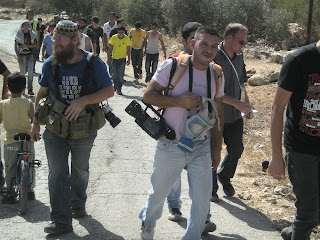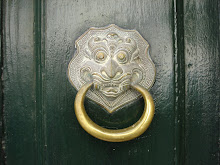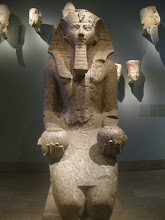Today, for the first time in my life, I saw soldiers firing teargas canisters across the sky.
We went to Bil'in, a village not far from Ramallah that I've never visited even though I've been in Palestine for a year now. Not because I didn't want to, but because I'm not courageous - or maybe heedless - enough to go.
You see, Bil'in is a village that's surrounded by Israel's Apartheid Wall - there, a stretch of electrified fence, heavily patrolled by the Israeli army - and that has had about 60% of its land confiscated by Israel for the surrounding Israeli settlements.
Every Friday, the villagers walk up to the wall to demonstrate peacefully against the confiscation of their land. And every Friday, the Israeli soldiers respond with shooting rubber-coated steel bullets, live ammunition and teargas canisters at the protestors.
Sometimes they shoot children, sometimes they kill. Mahmoud Yusef Abu Rahme, a 12-year-old boy participating in the non-violent demonstration one Friday in 2007, was shot in his head with a rubber-coated steel bullet at close range. Bassem Abu Rahme was shot in his chest with a tear gas canister last year; he died immediately. Abdullah Abu Rahme was shot in his head in 2008.
Today, on Friday 1 October, we thought we'd drive out to Bil'in and go somewhere close to the demonstration. Not too close (because we'd prefer not being shot at, or arrested), but close enough to perhaps get some shots of the non-violent demonstrators facing the armed soldiers on the other side of the fence that cuts through the village.
Not knowing exactly when the demonstration starts on Fridays, however, and then getting a little lost on the way, we came too late. We came when the demonstrators were walking back towards the village center through the olive fields, equipped with flags, cameras and gas masks.
We could still see the soldiers patrolling on the other side of the fence, driving military vehicles. A group of children were biking up the hill together with the demonstrators. A few Jews from Israel spoke Hebrew among themselves. Some from other solidarity groups around the world walked with them. The rest were from Bil'in.
Up on the crest of the hill stood an ambulance in case the Israeli soldiers would injure somebody. The medical personnel were also walking back up the hill.
The soldiers fired off a tear gas canister. As if to say to the demonstrators that they'd better be leaving. It cracked. Fizzed across the sky, and landed somewhere in the dry, yellow grass.
Not before long, Tarek, Moni and I were the only ones left on the hillside, save for a few village boys and a Palestinian woman harvesting olives on the side of the dirt road.
She had spread out sheets on the ground under the tree, and was picking the olives with her hands, one by one, dropping them down on the sheet. Her skin was browned from the sun, and she kept her hair out of her face with a light green shawl.
Suddenly the ladder toppled over and the woman fell to the ground. We ran over to her to help her up, and made sure that she wasn't hurt. The soldiers fired another tear gas canister at absolutely nobody further down the hill, and I exclaimed with irritation;
"Leesh?!" Why? "All the people already left."
The woman echoed my irritation with the soldiers, and then answered my question saying that they do it because she and her boys are there, harvesting their olives.
She called for her boys who had run across the street to watch the soldiers on the other side of the fence, worried for their safety. Then she climbed up the ladder again, because there were olives that needed picking.
"Yalla," she called to the boys, "help me so we can finish and go home."

We went to Bil'in, a village not far from Ramallah that I've never visited even though I've been in Palestine for a year now. Not because I didn't want to, but because I'm not courageous - or maybe heedless - enough to go.
You see, Bil'in is a village that's surrounded by Israel's Apartheid Wall - there, a stretch of electrified fence, heavily patrolled by the Israeli army - and that has had about 60% of its land confiscated by Israel for the surrounding Israeli settlements.
Every Friday, the villagers walk up to the wall to demonstrate peacefully against the confiscation of their land. And every Friday, the Israeli soldiers respond with shooting rubber-coated steel bullets, live ammunition and teargas canisters at the protestors.
Sometimes they shoot children, sometimes they kill. Mahmoud Yusef Abu Rahme, a 12-year-old boy participating in the non-violent demonstration one Friday in 2007, was shot in his head with a rubber-coated steel bullet at close range. Bassem Abu Rahme was shot in his chest with a tear gas canister last year; he died immediately. Abdullah Abu Rahme was shot in his head in 2008.
Today, on Friday 1 October, we thought we'd drive out to Bil'in and go somewhere close to the demonstration. Not too close (because we'd prefer not being shot at, or arrested), but close enough to perhaps get some shots of the non-violent demonstrators facing the armed soldiers on the other side of the fence that cuts through the village.
Not knowing exactly when the demonstration starts on Fridays, however, and then getting a little lost on the way, we came too late. We came when the demonstrators were walking back towards the village center through the olive fields, equipped with flags, cameras and gas masks.
Demonstrators with cameras and gas masks
We could still see the soldiers patrolling on the other side of the fence, driving military vehicles. A group of children were biking up the hill together with the demonstrators. A few Jews from Israel spoke Hebrew among themselves. Some from other solidarity groups around the world walked with them. The rest were from Bil'in.
Demonstrators heading back
Up on the crest of the hill stood an ambulance in case the Israeli soldiers would injure somebody. The medical personnel were also walking back up the hill.
Israeli soldiers behind the electric fence in Bil'in (photo courtesy of Tarek)
The soldiers fired off a tear gas canister. As if to say to the demonstrators that they'd better be leaving. It cracked. Fizzed across the sky, and landed somewhere in the dry, yellow grass.
Tear gas canister landing to the left (see the smoke?)
Not before long, Tarek, Moni and I were the only ones left on the hillside, save for a few village boys and a Palestinian woman harvesting olives on the side of the dirt road.
Palestinian woman harvesting olives
She had spread out sheets on the ground under the tree, and was picking the olives with her hands, one by one, dropping them down on the sheet. Her skin was browned from the sun, and she kept her hair out of her face with a light green shawl.
The boys observing an Israeli soldier on the other side of the fence (photo courtesy of Tarek)
Suddenly the ladder toppled over and the woman fell to the ground. We ran over to her to help her up, and made sure that she wasn't hurt. The soldiers fired another tear gas canister at absolutely nobody further down the hill, and I exclaimed with irritation;
"Leesh?!" Why? "All the people already left."
The woman echoed my irritation with the soldiers, and then answered my question saying that they do it because she and her boys are there, harvesting their olives.
She called for her boys who had run across the street to watch the soldiers on the other side of the fence, worried for their safety. Then she climbed up the ladder again, because there were olives that needed picking.
"Yalla," she called to the boys, "help me so we can finish and go home."
Burned-out tear gas canister


























No comments:
Post a Comment